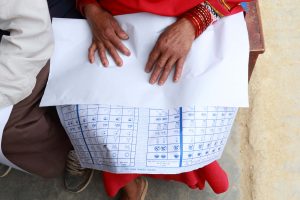The final evaluation of the Electoral Support Project (ESP) Phase II concludes that the project played a valuable role in supporting the Election Commission of Nepal (ECN) to hold credible elections to support the democratic transition in the country.
The evaluation was conducted by Sue Nelson, Evaluation Team Leader, and Dr. Prakash Bhattarai, National Expert between April and May 2018. The qualitative assessment for the evaluation covered the relevance, effectiveness, impact, efficiency, and sustainability of the project’s assistance, and the results and factors that affected the project’s performance.
The report concluded that ESP II was highly relevant in the democratic transition phase and was important to strengthen the administration of the elections, the credibility of the process and the participation of its citizens. This was achieved through:
- Strengthened institutional and professional capacities and confidence;
The impact of ESP II’s assistance, combined with the activities, was evident in the ability of the ECN staff at national and district levels to handle the administration of the 2017 elections with substantially reduced levels of outside assistance. These elections were complex, done in phases and within a very short timeframe. Its tasks were made even more difficult by the late passage of required legislation and Nepal’s difficult geographic conditions. [extract of project evaluation]
- Expanded efforts for gender equality and social inclusion;
ESP II technical assistance helped to expand this policy to include other groups, resulting in the ECN’s first Gender and Inclusion Policy in 2013. This policy provides a broad framework for the ECN to: mainstream gender in the electoral process; promote socially inclusive electoral processes; and, enhance its technical and institutional capacity to address Gender Equality & Social (GESI) issues.[extract of project evaluation]
- Increased international visibility and profile for the Election Commission of Nepal;

- A continuing voter registration system with a more accurate voter registry that increased stakeholder confidence.

The evaluation quotes a former Chief Election Commissioner of Nepal:
“I wanted to leave something behind. UNDP was instrumental in this. Biometric registration, first-time voter ID cards, EEIC, Media Centre. We have changed. Our people have been trained in elections, understanding of the electoral process, democratic process, how you deliver things and why.”
The evaluation team recommends for UNDP and its partners to stay engaged and support the Election Commission, government and civil society efforts to consolidate the progress made with ESP support, further strengthen ECN, support the decentralization of the electoral process, and continue to work for the inclusive participation of voters, especially women, people with disabilities and marginalized groups.

For a potential successor project, the team recommends to adopt a smaller project profile and a more strategic engagement using a programmatic approach and to increase focus on sustainability elements of assistance. The evaluators stress that next cycle of elections is as important to support as the last ones as they will consolidate the democratic transition, and their quality will set precedents for the future.
The evaluation and the UNDP management is available in the UNDP Evaluation Resource Centre.
___________________________________________________________________________________________________________________________
The Electoral Support Project- Phase II (ESP) is a technical assistance initiative which focuses on a long-term institutional and professional capacity development of the Election Commission (ECN) for conducting credible, inclusive and transparent elections. The objectives of the project are 1) to strengthen the capacity of the ECN to function as an independent and credible institution, 2) to allow the conduct of the election cycle in an effective, sustainable, and credible manner, and 3) to increase democratic participation, particularly for under-represented and disadvantaged segments of the Nepali society. ESP is currently funded by EU.
